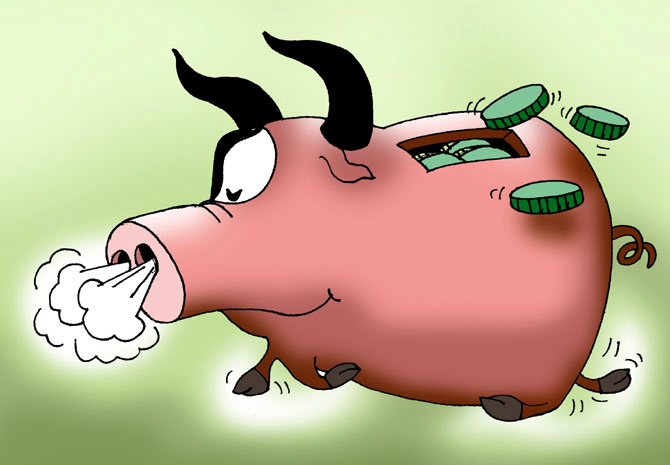It would perhaps make more sense if the finance ministry gave greater emphasis on the need for a similar exercise to phase out exemptions and concessions in indirect taxes like customs and excise, says A K Bhattacharya.

Of the many Budget numbers that finance ministers have been dishing out every February over the last several years, the ones that are the least discussed or scrutinised pertain to tax revenues lost on account of the various concessions and incentives doled out by the government.
It is possible to argue that this is not a real revenue loss.
This is because denying those concessions or exemptions could eliminate the losses under those tax heads, but the move could adversely affect several other types of economic activities reducing revenue flows from those areas.
So, the overall gain could well be negligible and benefits of those concessions for specific sectors would be lost.
Nevertheless, the impact of these concessions on tax collections and the potential revenue loss numbers have reached a level that governments must start taking serious note of them.
The Union Budget, presented last month, estimates the aggregate revenue impact of these concessions and incentives on central taxes at Rs 6.11 lakh crore in 2015-16, an increase of about 10 per cent over Rs 5.54 lakh crore seen in 2014-15.
In other words, other things remaining the same, the government's tax revenues would have increased by those amounts if the various concessions, incentives and exemptions were withdrawn.
The amounts in question here are not small - the government's total tax revenue collections in 2015-16 would be Rs 14.59 lakh crore compared to Rs 12.44 lakh crore in 2014-15.
Imagine the upside in government revenues if there are no such concessions and even half the potential revenue loss is recovered.
Indeed, this could well allow the government to reduce the tax rates in areas where the concessions are withdrawn.
To be sure, Finance Minister Arun Jaitley has already made his intention on this front quite clear.
Last year, he announced that the corporation tax rate would be reduced from 30 per cent to 25 per cent over a period of four years and the various exemptions and concessions would be phased out.
This year, he cut the corporation tax rate for all new companies to 25 per cent provided they did not claim any concessions linked to profit or investments.
Even companies below a turnover of Rs 5 crore (Rs 50 million) would now be taxed at 29 per cent.
The road map for phasing out the concessions and exemptions is already made public and action on that would follow in the coming year or so.
Ideally, there can be no quarrel over the government's intention to reduce tax exemptions across sectors.
Ten years ago, in 2005-06, total tax revenues foregone as a result of such concessions were estimated at Rs 2.1 lakh crore.
This was over 56 per cent of the total tax collected by the Centre under various heads that year. In 2009-10, the share of foregone tax revenues in total tax collections rose to as high a level as 85 per cent.
It has been declining since then - to 72 per cent in 2010-11, 60 per cent in 2011-12, 55 per cent in 2012-13 and further down to 48 per cent in 2013-14.
The following two years have seen that share of foregone tax revenues in total tax collections hover around 44 and 41 per cent. And in the current year, it would be 42 per cent.
If indeed the exercise to phase out tax exemptions and concessions continues, the share would come down further. But an area of concern is the break-up of foregone revenues from direct and indirect taxes.
The bulk of the revenue impact comes from indirect taxes - they accounted for 43 per cent of the total tax revenues collected in 2005-06 and ten years later they continue to have a share of 33 per cent.
In contrast, the share of foregone revenues on account of direct tax concessions in total tax collections has declined at a sharper pace from over 13 per cent in 2005-06 to over 8.8 per cent in 2015-16.
In other words, the foregone revenues on account of indirect taxes (as per cent of gross tax collections) in the last ten years have declined by 23 per cent, but their decline on account of direct taxes has been higher at 32 per cent.
This is where the government needs to examine its policy focus on phasing out of tax concessions. The finance minister's focus on phasing out tax exemptions is correct. But the exercise has begun with direct taxes.
It would perhaps make more sense if the finance ministry gave greater emphasis on the need for a similar exercise to phase out exemptions and concessions in indirect taxes like customs and excise, which make a bigger dent in the government's total tax collections.












 © 2025 Rediff.com -
© 2025 Rediff.com -